David Cameron meets displaced Tamils at a refugee camp in Jaffna (Number 10)
The former British Prime Minister once spearheaded efforts on accountability for war crimes on the island. Now, he is drumming up investment for a controversial multibillion-pound Chinese project in Colombo.
___
“Four years after the conflict no one has been held to account for grave allegations of war crimes and sexual violence, journalists are routinely intimidated and thousands of people have yet to find out what has happened to their missing relatives,” wrote David Cameron in the Tamil Guardian as he prepared to visit Sri Lanka in 2013.
“I want to see that change.”
The then-British prime minister was under immense pressure to cancel his presence at the annual Commonwealth Heads of Government Meeting, which was being hosted by Colombo. Both his Canadian and Indian counterparts had already publicly declared they would not attend due to the state’s lack of accountability for an egregious array of crimes that had left hundreds of thousands of Tamils killed during decades of armed conflict. Accused war criminals continued to hold senior government roles and the Sri Lankan state had demonstrated little appetite to change that.
The British prime minister however insisted on attending and went on to deliver a robust message to Sri Lanka’s leaders as he pledged to back an international inquiry into war crimes, refused to shake the hand of then-defence secretary Gotabaya Rajapaksa and insisted on travelling to the military occupied North-East, where he was surrounded by distraught relatives of those forcibly disappeared by Sri Lankan forces.
More than a decade on from Cameron’s visit little has changed in Sri Lanka. Accused war criminals have not been brought to justice, and the very same Tamil mothers who poignantly pleaded with Cameron continue their daily protest to find their loved ones.
The former British premier, however, is back on the Sri Lankan scene. This time, he isn’t pushing for accountability for war crimes. Instead, he is rounding up billions of dollars of investment for a controversial Chinese-backed project.
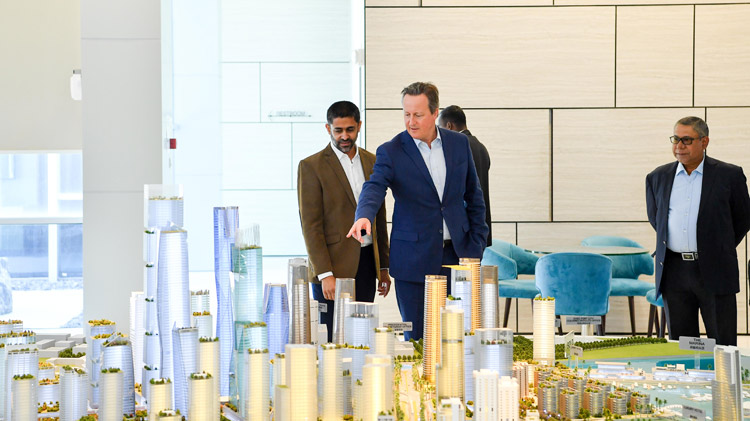
Cameron in Colombo, January 2023.
“While Sri Lanka faces some challenges ahead, the ample opportunities that it represents for growth, in the region and beyond, are incredible,” Cameron told an audience in the UAE last month. He had been flown in to promote ‘Port City Colombo’ - a US$1.5 billion-dollar project that is funded by China and will be constructed and operated by the state-run China Harbour Engineering Company (CHEC).
“Port City Colombo is at the centre of this sea of opportunity, and if the right environment is created, which I believe Port City Colombo is doing, then Sri Lanka’s potential is unlimited.”
The message was a far cry from his remarks a decade ago, particularly given the multiple concerns the Port City project has raised right from its inception.
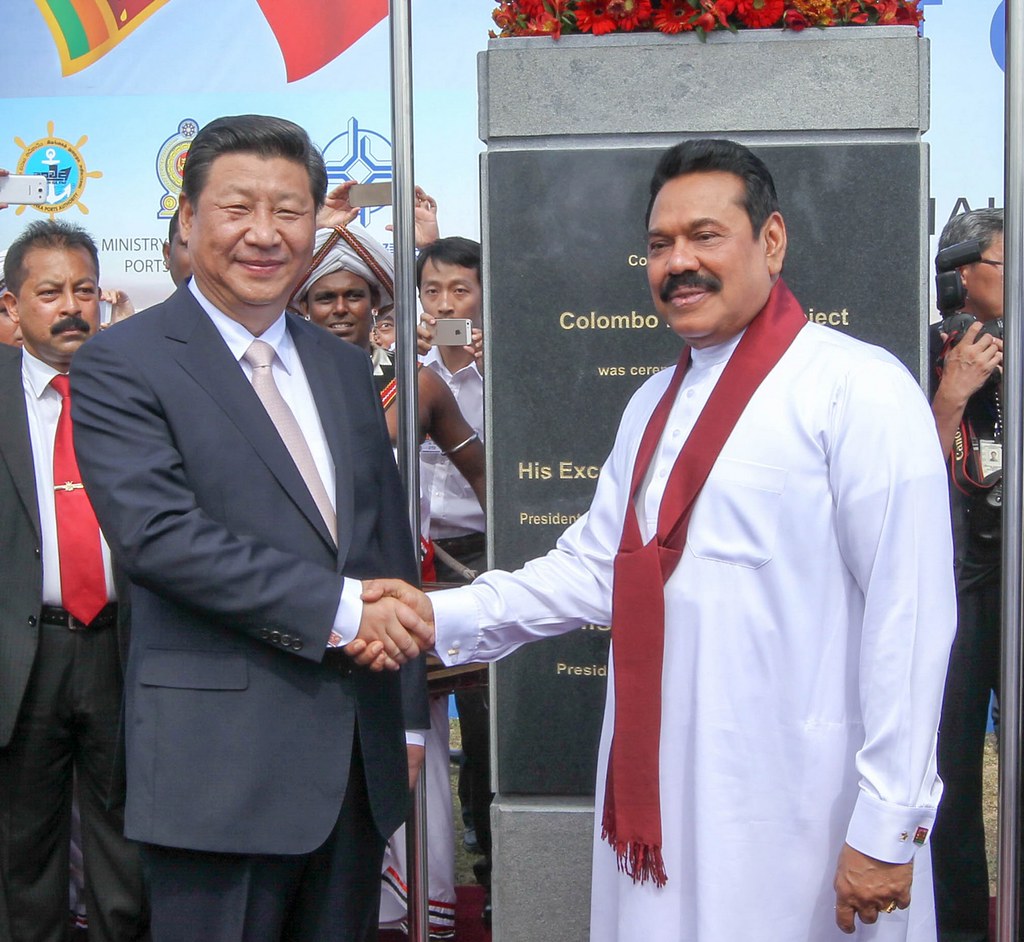
Mahinda Rajapaksa and Xi Jinping pose for a photograph after inaugurating the “Colombo Port City” project in 2014.
This was not the first Chinese proposed project on the island, with the CHEC also having built a port in Sri Lanka’s Hambantota province. However, Colombo was unable to repay the construction debt forcing the government to relinquish majority control of the port in 2017 in lieu of repayment - a cautionary tale highlighting the issue of China’s "debt-trap diplomacy".
The CHEC is a subsidiary of China Communications and Construction Company (CCCC), a company that also remains under sanctions by the United States. Yet it continues to maintain close ties with Sri Lanka’s political elite. The New York Times reported in 2018 that around US$7.6 million from CHEC was given directly to accused war criminal Mahinda Rajapaksa’s 2015 presidential election campaign, as he sought to deepen ties with Beijing. On the Port City project itself, the New York Times added that “along with that deal came roughly 50 acres of land, solely held by the Chinese company, that Sri Lanka had no sovereignty on”.
In 2021, then US Ambassador to Sri Lanka, Alaina B. Teplitz, went on to raise concerns over the legislation covering Colombo’s Port City. “There appear to be openings for either corrupt influences or potential of illicit financing, money laundering and things like that. US companies are going to be wary of that,” Teplitz told a round-table discussion. “Doing business with that company [CHEC] might not be advisable,” she added. “US companies are going to be wary of that.”
Her remarks followed a damning US State Department report which warned investors of the risks they faced in Sri Lanka, including how its “import regime is one of the most complex and protectionist in the world”.
Despite the thorny questions over China’s role, Cameron seemed undeterred in his support for the Port City construction.
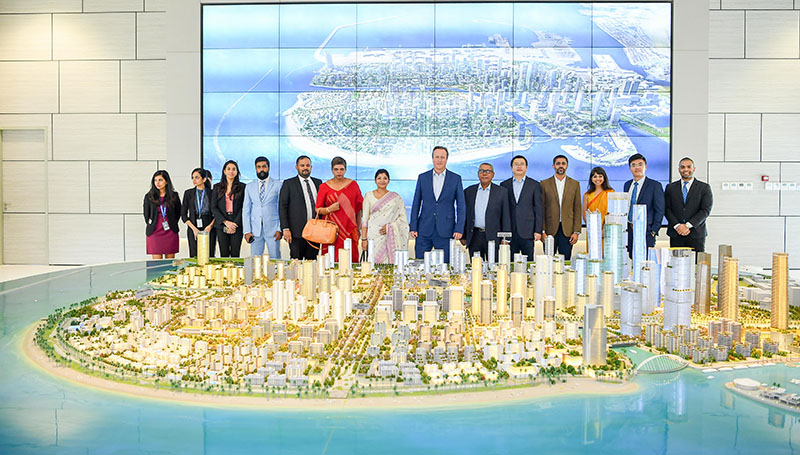
Cameron visited the Port City Colombo site in January 2023.
He visited Sri Lankan in January earlier this year, where he met with Sri Lanka’s president and was flanked by officials as he toured the proposed project site – the very same spot where Rajapaksa shook hands and signed deals with Beijing. According to Sri Lanka’s investment minister said, the decision to enlist Cameron “was taken by the Chinese company, not the government.”
“The Sri Lankan project is a classic example of how China buys votes and influence in developing countries and then sends the bailiffs in when those countries can't keep up the payments,” Conservative MP Tim Loughton told Politico, in a piece that dubbed him 'The smiling face of Chinese interests in the Indo-Pacific'. “Cameron should be working to help wean vulnerable countries off Chinese influence and debt rather than tying them in more tightly,” said Loughton.
“Cameron of all people must realize that China’s Belt and Road is not about help and support and development, it’s ultimately about gaining control — as they’ve already demonstrated in Sri Lanka,” added former Conservative Party leader Iain Duncan Smith. “I hope that he will reconsider the position he’s taken on this.”
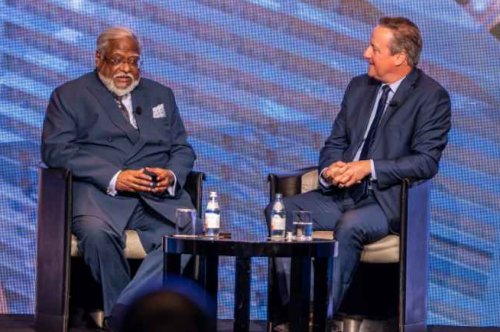
Cameron alongside Nirj Deva promoting the Port City project last month.
For human rights activists and Tamils around the world, including those on the island, the complete disregard of his previous stance on human rights is most glaring.
A press release from the Porty City project claimed Cameron lauded the “reforms” and commitment of the current Sri Lankan president Ranil Wickremesinghe, a figure that ordered crackdowns on anti-government protestors last year.
Cameron was photographed on stage addressing potential investors alongside Nirj Deva, a former British Conservative MEP and a vocal supporter of successive Sri Lankan governments, who once described Sri Lanka’s slaughter of tens of thousands of Tamils in 2009 as a “hostage rescue mission”.
He reportedly went on to “[explain] to investors how Sri Lanka has had to recover from the aftermath of a 30-year-old war which derailed the country’s economy, and that it has done so, successfully.”
When it comes to accounting for the deaths, disappearances and human rights abuses that Cameron wrote about a decade ago, there has been no success. Indeed, since Cameron’s visit to the Tamil homeland, several Sri Lankan presidents have taken office, and all have staunchly opposed the international investigation, that Cameron pledged he would back.
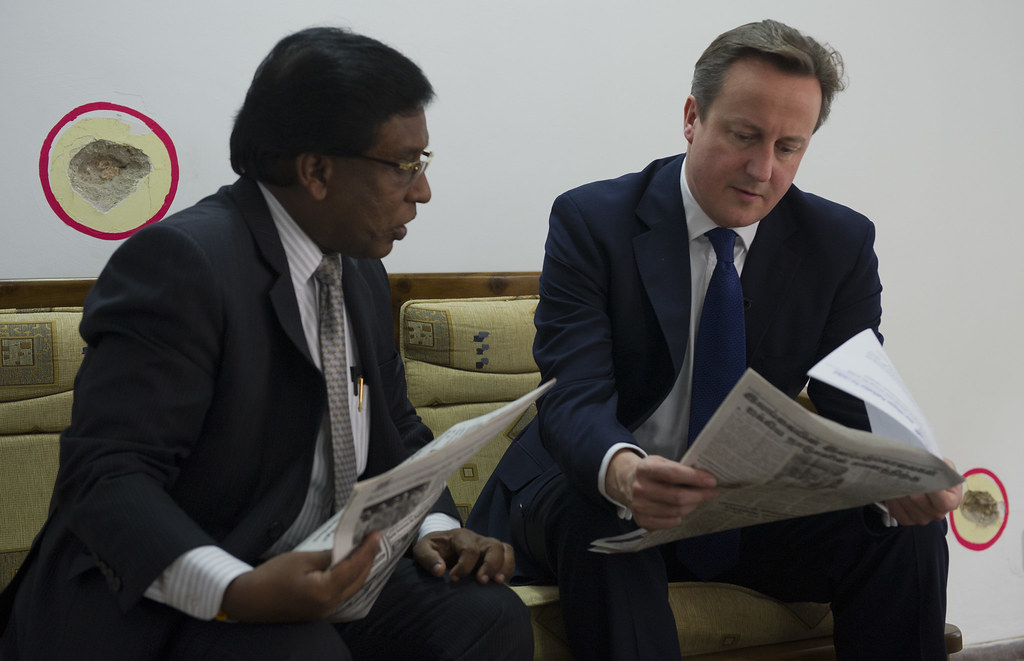
Cameron visited the office of a Tamil newspaper. The red circles on the wall mark bullet holes. (Number 10)
“When David Cameron visited Jaffna, Tamils were hopeful that finally some international pressure would follow,” said Kanthaiya*, a Tamil journalist who was in Jaffna, covering Cameron’s 2013 visit to the North-East.
The trip seemed to have made an impression on the British premier. In his memoirs, Cameron describes visiting Jaffna Library and how “government forces tried to eradicate Tamil history”.
“I visited the Tamil newspaper’s offices and met the editor, who has lived in the building for the past three years because he feared for his life. There was a charred printing press that had been shot and burned by regime hoodlums, and the walls were covered with bullet holes where journalists had been murdered.”
“I went to a refugee camp, whose existence the regime denied. I’ll never forget the crowds of women, holding up photos of young men, desperate to tell us their stories. We all had letters thrust towards us about these sons, husbands, fathers and brothers who had surrendered to the military and not been seen since. What had happened to them? Could we help find them?”
“Instead, what we have seen is the British government continue to fail us,” continued Kanthaiya*. “There has been no international accountability mechanism. Now he is out of office, he has forgotten all about the promises he made and is working with the same regime responsible for the crimes he saw first-hand.”
Back in the UK, Conservative parliamentarians once pointed to Cameron’s stance on Sri Lanka as a sign of their commitment to the British Tamil community. His out-of-office ventures, however, have shifted the tone.
“The British Tamil community is deeply dismayed over reports of former Prime Minister David Cameron endorsing the Colombo Port City project, a component of the Chinese Belt and Road Initiative,” said Gajan Raj, Secretary of the British Tamil Conservatives (BTC).
“Notably, Mr. Cameron, as the first world leader to visit Jaffna since World War II, and first world leader to advocate for independent international investigations into mass atrocities committed by Sri Lanka, held a resolute stance on pursuing justice,” he added. “When Mr Cameron was in Sri Lanka he declared “The message I have is that this issue will not go away and needs to be pursued vigorously”.”
“Today, witnessing Mr. Cameron promote Sri Lankan government initiatives, despite the country not delivering on accountability and justice, is profoundly disheartening. We earnestly hope for Mr. Cameron's return to championing noble causes such as human rights and justice, rather than associating with commercial ventures of states facing allegations of genocide.”
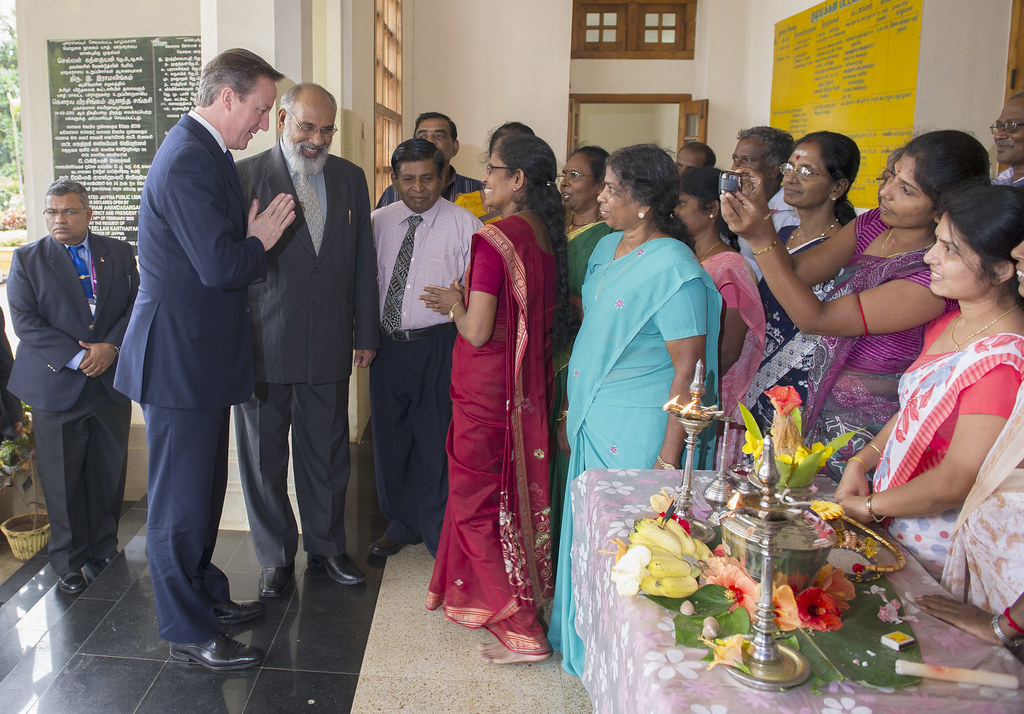
Cameron meets Tamil officials in Jaffna, 2013. (Number 10)
For other British Tamils, Cameron’s change of heart was unsurprising.
"This is sadly to be expected,” said Sen Kandiah, Chair of Tamils for Labour. “Another Conservative leader casting a blind eye to the ongoing suffering of Eelam Tamils.”
“Thirteen years of Conservative rule and not a single military or government official in Sri Lanka has been sanctioned for war crimes,” he continued. “Instead, we see increasing trade and cooperation between the UK and Sri Lanka irrespective of human rights abuses. The Labour party upholds its commitment to Tamils and has vowed to bring Sri Lanka before the ICC to deliver on justice and accountability for the genocide suffered".
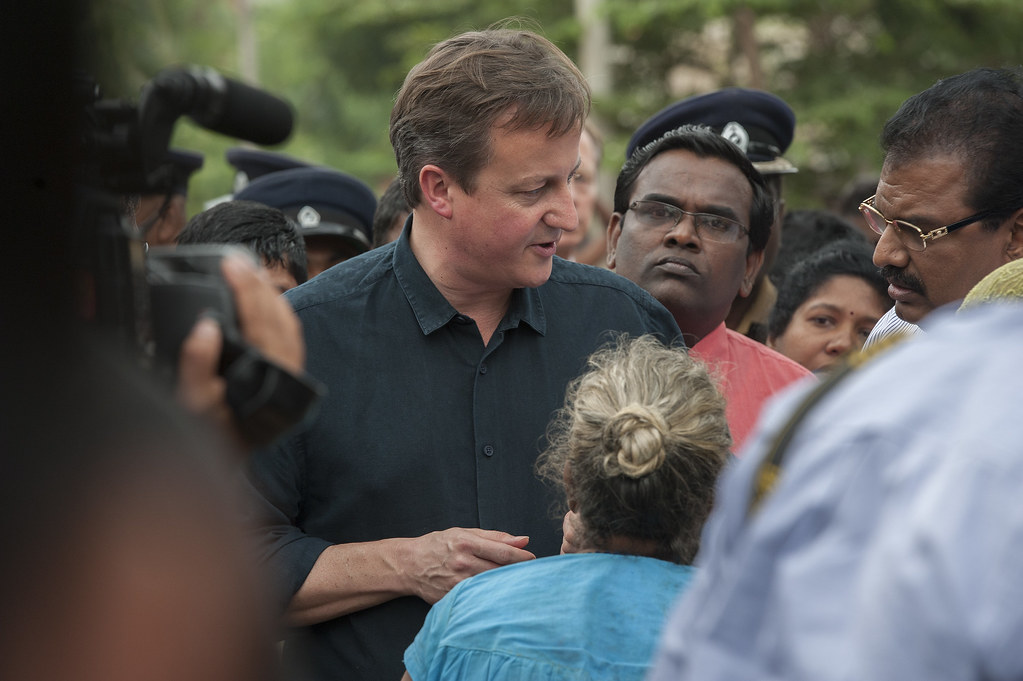
Cameron at a Jaffna refugee camp, 2013. (Number 10)
“I will never forget the faces of those I met in Jaffna,” said Cameron, in another piece for the Tamil Guardian in 2015.
“Their stories of unbearable suffering and loss will stay with me forever and continue to drive me in pushing for change. What I saw and heard also underlined why I went there in the first place: to shine a light on the lack of progress and to help bring about international pressure for reform. We owe it to victims and survivors across Sri Lanka to ensure that those responsible are held to account.”
“And we will not forget them.”
_____
*Name changed on request, due to fears over the safety of Tamil journalists on the island.
